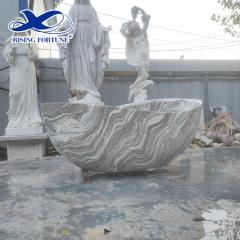Natural Stone
Natural stone is quarried directly from the earth and includes materials like marble, granite, limestone, travertine, and slate.
Pros:
1. Unique Aesthetic: Each piece of natural stone has unique patterns, colors, and textures, offering a one-of-a-kind look.
2. Durability: Stones like granite are highly durable and resistant to scratches and heat.
3. Longevity: With proper care, natural stone can last for decades.
4. Adds Value: Natural stone can increase the resale value of a home due to its premium appeal.
Cons:
1. Porosity: Many natural stones are porous and require sealing to prevent staining and water damage.
2. Maintenance: Regular sealing and cleaning are necessary to maintain its appearance.
3. Cost: Natural stone is generally more expensive than artificial stone.
4. Variability: Natural variations in color and texture can make it harder to achieve a uniform look.
Artificial Stone
Artificial stone, also known as engineered stone, is made from a combination of natural materials (like quartz or crushed stone) and resins or polymers. Popular examples include quartz, solid surface, and acrylic-based materials.
Pros:
1. Consistency: Artificial stone offers a uniform appearance, making it easier to match slabs for a cohesive look.
2. Non-Porous: Materials like quartz are non-porous, making them highly resistant to stains, bacteria, and water damage.
3. Low Maintenance: Requires minimal upkeep compared to natural stone.
4. Cost-Effective: Generally more affordable than natural stone.
5. Customizable: Available in a wide range of colors and patterns.
Cons:
1. Less Unique: Lacks the natural variations and uniqueness of natural stone.
2. Heat Sensitivity: Some artificial stones can be damaged by high heat.
3. Durability: While durable, it may not be as hard as natural stones like granite.
4. Environmental Impact: The production process involves resins and polymers, which may not be as eco-friendly as natural stone.
Best Types of Stones for Bathrooms
Bathrooms require materials that are water-resistant, durable, and easy to clean. Here are the best options:
Natural Stone Options:
1. Granite: Highly durable, water-resistant, and available in a variety of colors. Requires sealing.
2. Marble: Luxurious and elegant, but porous and prone to staining. Best for low-moisture areas like vanity tops.
3. Sintered Stone: Naturally slip-resistant and durable, making it ideal for bathroom floors.
4. Travertine: Offers a warm, natural look but requires regular sealing.
Artificial Stone Options:
1. Quartz: Non-porous, low-maintenance, and available in a wide range of colors and patterns. Ideal for countertops and walls.
2. Solid Surface: Seamless and easy to clean, but less durable than quartz. Suitable for vanity tops.
3. Porcelain: Highly water-resistant and durable, making it a great choice for floors and walls.
Recommendation
- For Countertops and Vanities: Quartz (artificial) is the best choice due to its non-porous nature, low maintenance, and durability. Granite (natural) is a close second if you prefer a unique, high-end look.
- For Floors: Slate (natural) or porcelain (artificial) are excellent options due to their slip resistance and water resistance.
- For Walls: Marble (natural) for a luxurious look or quartz (artificial) for a practical, low-maintenance option.
Ultimately, the choice depends on your budget, design preferences, and willingness to maintain the material. If you prioritize durability and low maintenance, artificial stone (especially quartz) is often the better choice for bathrooms. If you value uniqueness and are willing to invest in upkeep, natural stone can provide a timeless, elegant look.
If you want to know more information about our stone, pls email via: may@risingfortunetrading.com, or whatsapp/ wechat: 086 18150018770.















